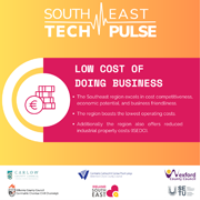RIKON Research Centre, in partnership with regional economic agencies, Local Authorities, and SETU, was commissioned to document key data relating to the Southeast tech firms’ operations in Waterford and the Southeast.
The premise of the Tech Pulse survey was to serve as a deep-dive document into the sector and will be used to inform policymakers, investors and start-ups about the region’s tech landscape, within the context of the wider economic landscape.
With contributions from 71 tech companies of varying scales in Waterford and the Southeast region, the findings highlighted that the Southeast region is home to one of the country’s most vibrant tech clusters, with an eclectic mix of established multinationals to new and agile start-ups the region represents a place of opportunity for business and investment.
There are a variety of reasons why companies are choosing to invest in the Southeast region.
The Southeast has a thriving ecosystem of both multinational companies and indigenous startups. The Southeast tech sector is made up of both domestic and international businesses with 35% of businesses operating for more than 20 years.
Within the SME population, 19% are in the medium category, 29% small, and 52% micro. Across the different sizes there is a bullish outlook on employment growth over 1, 2, and 5-year time horizons.
Waterford’s tech ecosystem offers diverse career development opportunities, from skill diversification and industry adaptability to continuous learning.
The Southeast region supports personal and professional growth, enabling employees to advance within the sector without needing to relocate. There are approximately 6000 tech professionals across an estimated 900 businesses.
The region's talent pool was also cited as a factor in attracting investment in the region. The region has been home to some of the strongest recent population growth in line with the national development plan and national planning framework for regional cities.
The Southeast region and Waterford City has been home to some of the fastest population growth between census years, with the region well placed to continue the pipeline students through the regions’ strengthening third level education, headlined by the South East Technological University (SETU).
With SETU home to almost 20,000 students per year, over 1,300 are directly studying towards a career in tech.
In terms of cost competitiveness, economic potential, and business friendliness the Southeast region preforms strongly. The region boasts the lowest operating costs and reduced industrial property costs (ISEDO). The Southeast also offers significantly lower residential rental and house purchase costs.
Regional residential rents are 21% below national average and Waterford City rents are 22% below the regional city-averages. While those looking to purchase would see a 10% and 27% drop in the same comparison.
Quality of life is highly regarded in the region by the tech sector, with 94% respondents rating the quality of life as good or very good, education at 81% and the natural environment at 91%.
Companies in the region are also most likely to offer remote-friendly and hybrid roles to their workforce (66%), with 83% indicating that they intend to continue their current remote working policies into the future. Commute times approximately 7% below the national average is also a contributing factor to positivity regarding the quality of life in the region.
The tech sector is known for its innovative spirit and that is no different in the Southeast, where 94% of respondents reported active engagement in innovation, be that product or process.
Speaking of the findings, Gareth Evans, Head of Enterprise, Waterford Local Enterprise Office said, "The main takeaways from the Tech Pulse survey are extremely positive and bode well for the continued growth of the region's tech sector.
"There is a culture of innovation and dynamism within the tech sector. This, coupled with a favourable quality of life environment, access to a deep academic talent pool and operating from the one of the fastest growing regional economies in Europe, has resulted in a robust and progressive tech cluster in the region."
With a mix of affordability, a growing wealth of talent and opportunities for collaboration the area continues to attract companies looking to expand or establish themselves.
The balance of economic potential and innovation creates a compelling setting where businesses can draw on local talent to drive success. The region’s steady growth positions it to remain a key contributor to the country’s tech sector.



